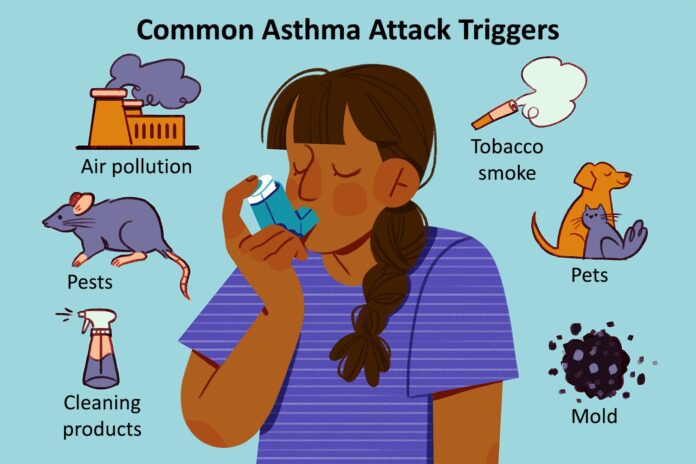Asthma is a chronic respiratory disease that affects the airways, making it difficult to breathe. It is a common condition, affecting millions of people worldwide, and is characterized by inflammation and narrowing of the airways that carry air to and from the lungs. This inflammation can cause a range of symptoms, including wheezing, coughing, shortness of breath, and chest tightness.
Causes: The exact cause of asthma is unknown, but it is believed to be caused by a combination of genetic and environmental factors. Some people may have a genetic predisposition to asthma, while others may develop the condition due to exposure to certain triggers such as allergens, pollutants, respiratory infections, and exercise.
Diagnosis: The diagnosis of asthma is usually made based on a combination of symptoms, medical history, and diagnostic tests. A doctor may perform a physical exam and ask questions about the patient’s symptoms, family history, and medical history. They may also perform tests such as spirometry, peak flow testing, and allergy testing to confirm the diagnosis.
Symptoms: The symptoms of asthma can vary from person to person and may be mild or severe. Common symptoms include:
1_Wheezing: a whistling or hissing sound when breathing
2_Coughing: especially at night or early morning
3_Shortness of breath: feeling like you can’t catch your breath
4_Chest tightness: feeling like your chest is being squeezed or compressed
Treatment: Asthma treatment typically involves a combination of medications and lifestyle changes. Medications may include bronchodilators, which help to relax the airways, and corticosteroids, which reduce inflammation. In some cases, immunomodulators may be used to help regulate the immune system.
Lifestyle changes may include avoiding triggers such as allergens and irritants, quitting smoking, and exercising regularly to improve lung function. In severe cases, hospitalization may be necessary, and oxygen therapy or mechanical ventilation may be required to assist with breathing.
In summary, asthma is a chronic respiratory disease that can be caused by a combination of genetic and environmental factors. It is diagnosed based on symptoms, medical history, and diagnostic tests. Treatment typically involves a combination of medications and lifestyle changes, and severe cases may require hospitalization. With proper management, most people with asthma are able to lead active and healthy lives.
































